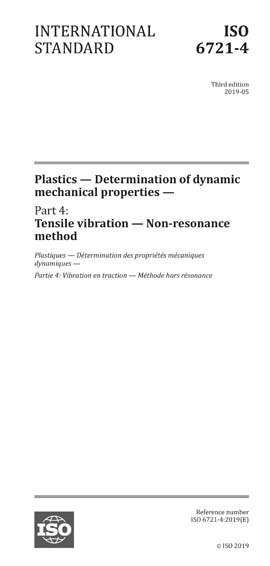Most recent
ISO 6721-4:2019
Plastics - Determination of dynamic mechanical properties - Part 4: Tensile vibration - Non-resonance method
This document describes a forced, non-resonance method for determining the components of the tensile complex modulus E* of polymers at frequencies typically in the range 0,01 Hz to 100 Hz.
NOTE Higher frequency measurements can be made, but significant errors in the dynamic properties measured are likely to result (see 10.2.2 and 10.2.3).
The method is suitable for measuring dynamic storage moduli in the range 0,01 GPa to 5 GPa. Although materials with moduli outside this range can be studied, alternative modes of deformation are intended to be used for higher accuracy [i.e. a shear mode for G′ < 0,01 GPa (see ISO 6721-6) and a flexural mode for E′ > 5 GPa (see ISO 6721-3 or ISO 6721-5)].
This method is particularly suited to the measurement of loss factors and can therefore be conveniently used to study the variation of dynamic properties with temperature and frequency through most of the glass-rubber relaxation region (see ISO 6721-1). The availability of data determined over wide ranges of both frequency and temperature enables master plots to be derived, using frequency-temperature shift procedures, which display dynamic properties over an extended frequency range at different temperatures.
International Organization for Standardization [iso]

